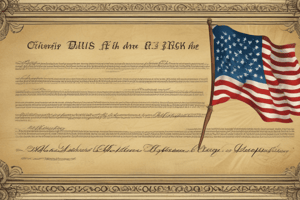Podcast
Questions and Answers
What right is guaranteed to the accused in a criminal prosecution?
What right is guaranteed to the accused in a criminal prosecution?
- Right to refuse an impartial jury
- Right to a speedy and public trial by an impartial jury (correct)
- Right to a speedy and public trial by a biased jury
- Right to a private trial by a jury of peers
What is the minimum value in controversy required for a trial by jury?
What is the minimum value in controversy required for a trial by jury?
- One hundred dollars
- Fifty dollars
- Ten dollars
- Twenty dollars (correct)
What type of punishments are forbidden according to Amendment VIII?
What type of punishments are forbidden according to Amendment VIII?
- Cruel and unusual punishments (correct)
- Harsh and unusual punishments
- Fair and lenient punishments
- Mild and reasonable punishments
What is the purpose of Amendment IX?
What is the purpose of Amendment IX?
What is reserved to the States or the people according to Amendment X?
What is reserved to the States or the people according to Amendment X?
What is the main purpose of Amendments VI, VII, VIII, IX, and X?
What is the main purpose of Amendments VI, VII, VIII, IX, and X?
What is the main purpose of the first ten amendments to the Constitution?
What is the main purpose of the first ten amendments to the Constitution?
According to Amendment I, what is guaranteed to the people?
According to Amendment I, what is guaranteed to the people?
What is the purpose of a militia according to Amendment II?
What is the purpose of a militia according to Amendment II?
Under what circumstances can a soldier be quartered in a house according to Amendment III?
Under what circumstances can a soldier be quartered in a house according to Amendment III?
What is the standard required for issuing warrants according to Amendment IV?
What is the standard required for issuing warrants according to Amendment IV?
What is the protection against double jeopardy according to Amendment V?
What is the protection against double jeopardy according to Amendment V?
What is the purpose of the Grand Jury according to Amendment V?
What is the purpose of the Grand Jury according to Amendment V?
What is the protection against self-incrimination according to Amendment V?
What is the protection against self-incrimination according to Amendment V?
Flashcards are hidden until you start studying
Study Notes
The U.S. Bill of Rights
- The Bill of Rights consists of the first ten amendments to the Constitution, ratified on December 15, 1791.
- These amendments safeguard individual rights and freedoms.
Freedom of Expression and Religion
- Congress cannot establish a national religion or prohibit the free exercise of religion.
- The freedom of speech, press, and peaceful assembly are protected.
- Citizens have the right to petition the government for redress of grievances.
Right to Bear Arms
- A well-regulated militia is necessary for a free state's security.
- The right of the people to keep and bear arms shall not be infringed.
Protection of Property and Persons
- Soldiers cannot be quartered in homes without the owner's consent, even in wartime.
- The right to be secure in person, house, papers, and effects is protected against unreasonable searches and seizures.
- Warrants must be issued upon probable cause, supported by oath or affirmation, and describing the place to be searched and the persons or things to be seized.
Protection Against Self-Incrimination
- No person shall be held to answer for a capital or infamous crime unless on a presentment or indictment of a Grand Jury.
- No person shall be subject to double jeopardy for the same offence.
- No person shall be compelled to be a witness against themselves in a criminal case.
- The right to life, liberty, or property cannot be deprived without due process of law.
- Private property cannot be taken for public use without just compensation.
Right to a Fair Trial
- The accused shall enjoy the right to a speedy and public trial by an impartial jury.
- The accused shall be informed of the nature and cause of the accusation.
- The accused shall have the right to confront witnesses against them, to obtain witnesses in their favor, and to have the Assistance of Counsel for their defense.
Trial by Jury
- The right to trial by jury shall be preserved in suits at common law where the value in controversy exceeds twenty dollars.
- No fact tried by a jury shall be re-examined in any Court of the United States, except according to the rules of the common law.
Protection Against Cruel Punishment
- Excessive bail shall not be required, nor excessive fines imposed, nor cruel and unusual punishments inflicted.
Retention of Rights
- The enumeration of certain rights in the Constitution shall not be construed to deny or disparage others retained by the people.
Powers Reserved to the States
- The powers not delegated to the United States by the Constitution, nor prohibited by it to the States, are reserved to the States respectively, or to the people.
Studying That Suits You
Use AI to generate personalized quizzes and flashcards to suit your learning preferences.




